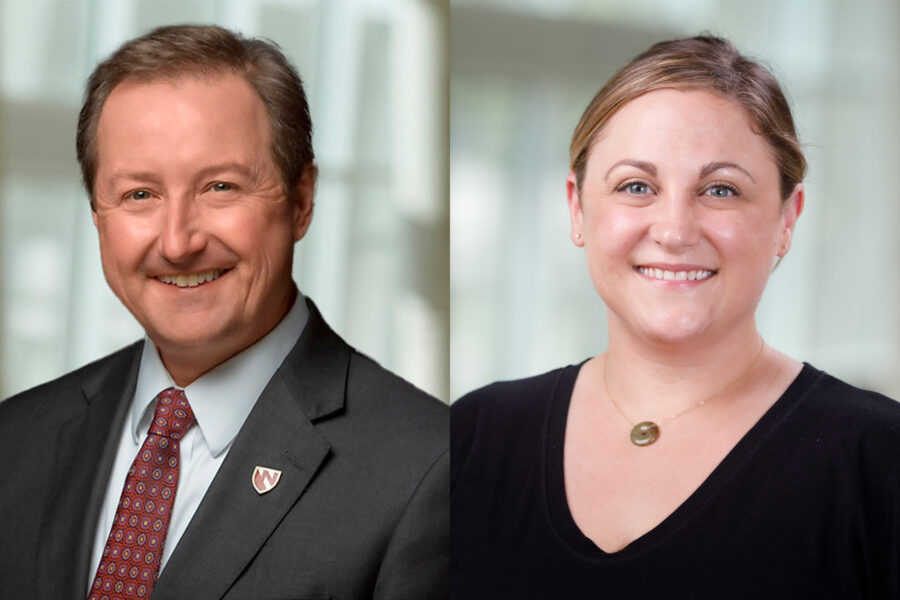The University of Nebraska Medical Center will be supporting the National Center for Disaster Medicine and Public Health in leading a novel approach to nationwide planning for disasters and other types of large-scale health crises.
UNMC, Nebraska Medicine and the med center’s Global Center for Health Security – with funding through the NCDMPH – will convene federal agencies and others across academia and industry to strategically develop worst-case scenario-based and operationally driven plans for meeting medical and public health requirements during national emergencies.
Such plans would reduce the need to “build on the fly,” an approach used during the COVID-19 pandemic when public health and medical communities were forced to quickly adapt to growing needs and develop hospital capacity on an ad hoc basis.
“As a nation, we must develop the ability to ‘build on the fly by design,’” said UNMC’s Lauren Sauer, associate director of research in the Global Center for Health Security. “As history has shown, when catastrophic events occur, the rules may not apply. A national plan that reflects this reality will enable us to identify and adopt opportunities for how we can more effectively respond in moments of crisis when minutes count.”
Sauer said development of a more dynamic plan for health crises is part of ongoing efforts to fortify the National Disaster Medical System, which Congress established to provide care for U.S. military casualties during the height of the Cold War. In 2020, recognizing the limits of the National Disaster Medical System to meet the requirements of a large-scale, potentially catastrophic event, Congress directed the Department of Defense to conduct a five-year NDMS Pilot Program to assess and improve the capacity and interoperability of the National Disaster Medical System. Led by the National Center for Disaster Medicine and Public Health, the NDMS Pilot Program has been assessing gaps, developing and validating solutions and making recommendations to Congress on policy changes and additional investments.
With the COVID-19 pandemic, additional lessons were learned, Sauer said. “We did a lot of things on the fly and now recognize the need for a proactive plan for when things are outside the norm,” she said. “Developing a business model for preparedness will help us address emergencies more quickly and effectively and create ‘build on the fly by design’ opportunities.”
A “build on the fly by design” approach could include discussions ranging from state-based health professions licensing to rapid scale development and deployment of therapeutics to solutions for quickly hiring, training and retaining more clinical staff, especially when the types of licensed professionals needed are simply unavailable.
“In the most severe of health crises, the standard approach to response will not succeed. We have to be ready to operate in an environment where the rules may not apply and the mission is paramount,” said Jeffrey Freeman, PhD, National Center for Disaster Medicine and Public Health director.
Any proactive national plan, Sauer said, must be dynamic and imagine worst-case scenarios for large-scale events, identify unconstrainted solutions and define courses of action. Planning participants will span government, academia and industry with diversity of experience as critical as expertise.
“UNMC is honored to partner with NCDMPH on this critically important collaboration, which fits squarely with the broader work of the Global Center for Health Security, the priorities of UNMC and our commitment to national preparedness,” said Chris Kratochvil, MD, vice chancellor for external relations at UNMC.
The National Center for Disaster Medicine and Public Health is a federal organization and component of the Uniformed Services University, with a mission to advance the nation’s medical and public health readiness for disasters. The center is governed by the federal interagency as a collaboration between the Departments of Defense, State, Health and Human Services, Homeland Security, Transportation and Veterans Affairs.
“We’re fortunate to have a partner like UNMC supporting this critical effort,” Dr. Freeman said. “From Ebola to COVID-19, UNMC has effectively delivered the cutting edge in science and technology to the leading edge of some of our nation’s greatest challenges, and we are confident they’ll do the same in this national effort.”
